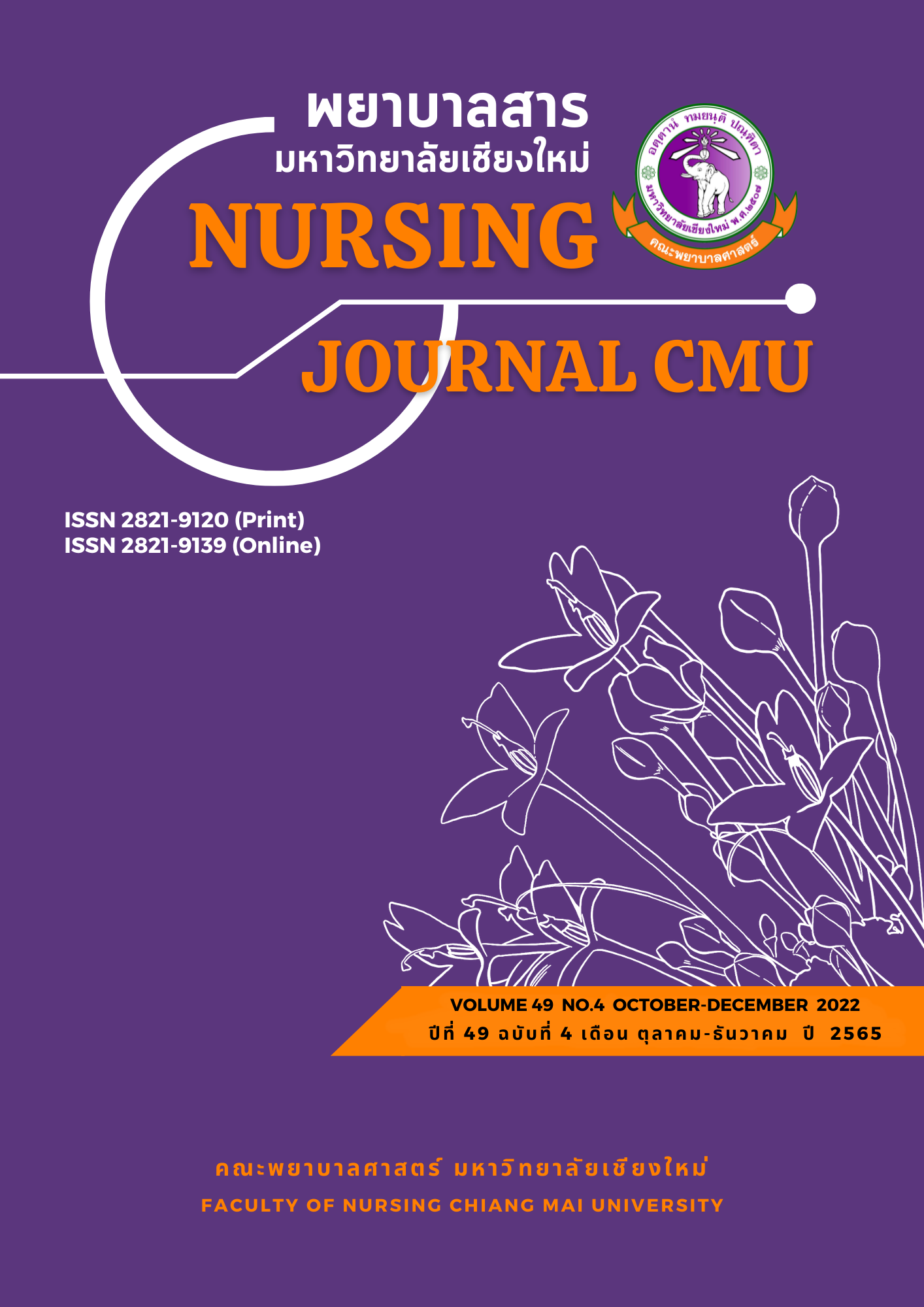Factors Related to the Choice of Treatment Methods Among Persons with Pre-dialysis Chronic Kidney Disease
Keywords:
Choice of treatment methods, Persons with pre-dialysis chronic kidney diseaseAbstract
For patients with chronic kidney disease, the proper choice of treatment is essential in attempting to control symptoms, reduce complications, and delay the progression of the disease. This descriptive correlational study aimed to examine the choice of treatment methods, and to explore the correlation between knowledge of chronic kidney disease and its treatments, family support, and the choice of treatment methods among persons with pre-dialysis chronic kidney disease. The purposive sampling included 85 participants who were diagnosed with stage 4 or 5 chronic kidney disease and received treatment at the outpatient clinic at Lampang Hospital. Research instruments consisted of: the Knowledge of Chronic Kidney Disease and Treatment Methods Questionnaire, the Family Support Questionnaire, and the Choice of Treatment Methods Questionnaire. The content validity was approved by six experts. The reliability of the Knowledge of Chronic Kidney Disease and Treatment Methods Questionnaire as well as the Family Support Questionnaire was determined, using Cronbach alpha coefficients, to be 0.88 and 0.79, respectively. Data were analyzed using descriptive statistics, and multinomial logistic regression.
The results of this study were as follows:
1. The most common choice of treatment method among participants was palliative care (45.90%), followed by continuous peritoneal dialysis, kidney transplant, and hemo- dialysis (23.50%, 18.80%, and 11.80%, respectively).
2.Knowledge of chronic kidney disease and treatment methods, and family support were not related to the choice of treatment method.
These findings could be used as a basis for further studies on the other factors related to the choice of treatment methods in pre-dialysis chronic kidney disease patients.
References
Ahmadi, S. M., Jalali, A., & Jalali, R. (2018). Factors associated with the choice of peritoneal dialysis in Iran: Qualitative study. Open Access Macedonian Journal of Medical Sciences, 6(7), 1253-1259.
Chanouzas, D., Ng, K. P., Fallouh, B., & Baharani, J. (2011). What influences patient choice of treatment modality at the pre-dialysis stage? Nephrology Dialysis Transplantation, 27(4), 1542-1547.
Daengsribua, A., Topark-ngarm, A., Tatiyanupanwong, S., & Limwattananon, C. (2015). Following up of stage 5 chronic kidney disease patients managed with non-dialytic treatment. Journal of Nursing Science & Health, 9(2), 181-192. (in Thai)
Griva, K., Li, Z. H., Lai, A. Y., Choong, M. C., & Foo, M. W. Y. (2013). Perspectives of patients, families, and health care professionals on decision-making about dialysis modality-the good, the bad, and the misunderstandings. Peritoneal Dialysis International, 33(3), 280-289.
House, J. S. (1981). Work stress and social support. Philippines: Addisson-Weslet.
Kansarn, N. (2015). Nursing care for patients with end stage renal disease (ESRD) having peritonitis form continuous ambulatory peritoneal dialysis (CAPD): A case study 2 case. Mahasarakham Hospital Journal, 12(2), 81-91. (in Thai)
Kannasoot, P. (1999). Statistics for behavioral research. Bangkok: Faculty of Education, ChulalongkornUniversity. (in Thai)
Kidney Disease Association of Thailand. (2017). Clinical practice recommendation for comprehensive conservative care in chronic kidney disease 2017. Bangkok: Text and Journal Publications. (in Thai)
Liang, C. H., Yang, C. Y., Lu, K. C., Chu, P., Chen, C. H., Chang, Y. S., ... & Chou, K. R. (2011). Factors affecting peritoneal dialysis selection in Taiwanese patients with chronic kidney disease. International Nursing Review, 58(4), 463-469.
Morton, R. L., Snelling, P., Webster, A. C., Rose, J., Masterson, R., Johnson, D. W., & Howard, K. (2012). Factors influencing patient choice of dialysis versus conservative care to treat end-stage kidney disease. Canadian Medical Association Journal, 184(5), 277-283.
Murray, M. A., Brunier, G., Chung, J. O., Craig, L. A., Mills, C., Thomas, A., & Stacey, D. (2009). A systematic review of factors influencing decision-making in adults living with chronic kidney disease. Patient Education and Counseling, 76(2), 149-158.
National Health Security Office. (2012). National health security fund management handbook, fiscal year 2013, volume 3, service budget management for chronic kidney disease. Bangkok: Srimuang. (in Thai)
Pasri, T. (2014). Family’s perspectives and support needs in caring for end-stage cancer patients (Master’s thesis). Prince of Songkla University, Thailand. (in Thai)
Polit, D. F., & Beck, C. T. (2008). Nursing research: Generating and assign evidence for nursing practice (8th ed.). Philadelphia: Lippincott.
Pungchompoo, W. (2014). Situation of palliative care in Thai elderly patients with end stage renal disease. Nursing Journal, 41(4). 166-177. (in Thai)
Sawasdiwan, W. (2014). 7th PD First policy for patients and Thai society. New Pace Journal, Joint Ideas, Building Together, Developing Health Security, 36(7), 2-6. (in Thai)
Sawatphol, C., Pengpinit, T., Sananikorn, A., & Srisuraphol, W. (2017). Care for elderly dependents in the Northeast of Thailand. Journal of MCU Peace Studies, 5(Special issue), 387-405. (in Thai)
Thaiwong, A. (2016). Relationship between unpleasant symptom clusters and quality of life among patients with chronic kidney disease (Master’s thesis). Mahidol University, Thailand. (in Thai)
Thanakitjaru, P. (2015). Current situation of chronic kidney disease in Thailand. Department of Medical Services, 40(5), 5-18. (in Thai)
Winterbottom, A., Bekker, H. L., Conner, M., & Mooney, A. (2014). Choosing dialysis modality: decision making in a chronic illness context. Health Expectations, 17(5), 710-723.
Wuerth, D. B., Finkelstein, S. H., Schwetz, O., Carey, H., Kliger, A. S., & Finkelstein, F. O. (2002). Patients' descriptions of specific factors leading to modality selection of chronic peritoneal dialysis or hemodialysis. Peritoneal Dialysis International, 22(2), 184-190.
Downloads
Published
How to Cite
Issue
Section
License
Copyright (c) 2022 Nursing Journal

This work is licensed under a Creative Commons Attribution-NonCommercial-NoDerivatives 4.0 International License.
บทความที่ได้รับการตีพิมพ์เป็นลิขสิทธิ์ของวารสารพยาบาลสาร
ข้อความที่ปรากฏในบทความแต่ละเรื่องในวารสารวิชาการเล่มนี้เป็นความคิดเห็นส่วนตัวของผู้เขียนแต่ละท่านไม่เกี่ยวข้องกับมหาวิทยาลัยเชียงใหม่ และคณาจารย์ท่านอื่นๆในมหาวิทยาลัยฯ แต่อย่างใด ความรับผิดชอบองค์ประกอบทั้งหมดของบทความแต่ละเรื่องเป็นของผู้เขียนแต่ละท่าน หากมีความผิดพลาดใด ๆ ผู้เขียนแต่ละท่านจะรับผิดชอบบทความของตนเองแต่ผู้เดียว






